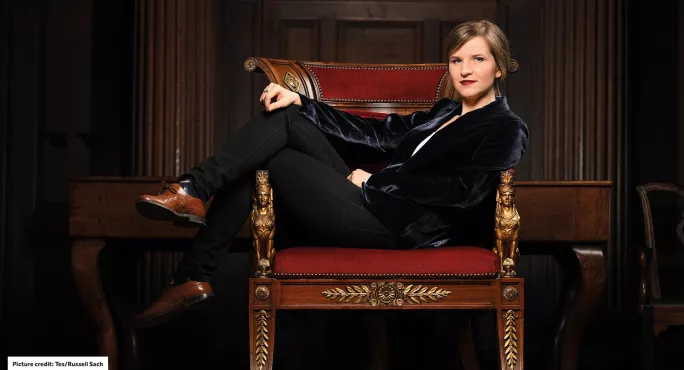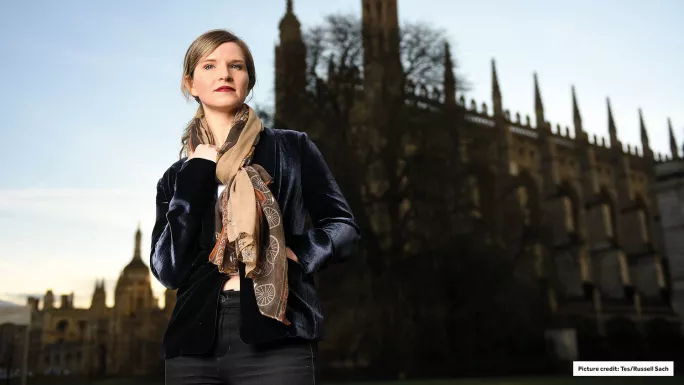- Home
- Tes talks to... Tara Westover
Tes talks to... Tara Westover

Tara Westover taught herself algebra and trigonometry when she was 17 years old - without having ever set foot in a classroom and having never been homeschooled. Her parents thought that formal education was a government ploy to lead children away from God.
Ten years later, she gained a PhD from the University of Cambridge.
Westover’s journey is not just a remarkable achievement: it also gives her a unique view on what education is for, how it should be done and what the power of knowledge really is. And she is keen to share it.
One of seven children, Westover spent the first 17 years of her life preparing for the end of the world with her survivalist family in the mountains of Idaho, a story she details in her new book, Educated.
Instead of going to school, she salvaged scrap metal for her father to sell and helped her mother to make homeopathic remedies. Her father was suspicious of government and - in addition to no schooling - there were also no state records of Westover’s existence, not even a birth certificate. There were no medical records either, because he believed that drugs were an abomination to God.

As part of this very insular family, she swallowed her father’s worldview whole.
“When I was a kid, there wasn’t much distinction between my father’s mind and my own,” she explains. “This is standard for young children - your parents are your role models and you take on their views as your own. It just happened that my father’s views were more extreme than most.
“I felt bad for children who went to school. They’d talk to me about it at church and I knew that they were being brainwashed and living immoral lives, because that’s what my father had told me.
“But deep down I was jealous, too - of their friendships, of them belonging to this ‘club’ that I was excluded from. [But] it was easy to find reasons to reject the concept of education, because I wasn’t allowed to be part of it.”
‘Reading was important’
One thing Westover could do was read - she was taught to at the age of 4 by one of her brothers.
“Reading was important in my family - we had to read scriptures, so it was essential. We all learned to read somehow or other,” she says.
Other than that, her home education was erratic at best: a very rare half-hearted effort at a maths textbook, which she would pretend to read, was about as formal as it got. Instead, she and her siblings were usually left to their own devices or made to do farm work, stew herbs and salvage scrap.
“This was the life that we knew and were expected to live, so what need was there for any other knowledge?” she explains.
It was her brother Tyler who put her on a different path. He had managed to “escape” to college and, on his return, he was horrified at what he found.
“Tyler was shocked at how dysfunctional things had become at home and he wanted me out of there,” she says. “He’d escaped to go to college and it was the only way out of my home life that he could think of. He’d taught himself enough to pass the entry exam - so he knew it was possible for me to do the same.”
It was at this point that she bought herself maths textbooks and began to study them, slowly making sense of the different symbols until she could solve the necessary equations.
“I know it must seem impossible to do that when you haven’t ever been taught how,” she says, “but if you’ve never been told that something isn’t possible, it holds no fear. You just do it.
“As much as I wish I’d had access to education earlier in my life, my parents’ attitude was always that you can teach yourself something better than anyone else can teach you. That was such a helpful attitude for me and is probably why I had such a determination to teach myself enough to pass my entry exam. They may not have educated me in the traditional sense, but this view made me believe that I could do it on my own.”
Against all odds, Westover passed the entrance examination and was accepted to study at Brigham Young University, where she had to teach herself not only how to learn from an educational establishment, but also how to live among others who did not have the same extreme views as her family.
After a rocky start, she thrived and went on to study at Harvard and Cambridge, gaining a BA, an MPhil and a PhD.
Key to success
So what does it tell us about our education system when a young woman with no formal experience of schooling until the age of 17 can achieve so highly in just a few years?
For Westover, the key to her success has been a passion for education. She feels that this is where mainstream schooling can go wrong: it beats that passion out of children through curriculum choices and testing.
“When education becomes associated with boredom and passivity, it becomes almost a punishment,” she argues. “[Once I was in school] I never resented the hours I had to spend studying and writing essays. But I had to do it for only a few years, so it was no big deal. If I’d had to spend my life from the age of 5 on the education conveyer belt, perhaps I would have become tired of it by then. I’m so grateful that I wasn’t taking tests from seven years old. I came to education fresh and ready to learn, rather than burned out.”
She believes that children are being turned off education because it denies them a voice and a role. “We start teaching children formally at such a young age,” she says. “I worry about five- and six-year-olds having to sit quietly in a classroom, listening, and learning that this is education…They’re farmed through school, achieving one objective then being pushed to the next. At what point do they get a say in what they want to learn and achieve?”
Westover is adamant that we could achieve much more if children were involved in designing their own curriculum and choosing their learning path.
“Maybe teachers need to be getting the class together at the start of term and asking: ‘What do you want to learn about? What do you want to read?’ Get them past the view that education is predominantly passive and instead let them realise their minds have the potential to expand…Kids see education as classroom, chalkboards and exams. But that isn’t what it’s about. It’s about making a person…It’s about challenging your existing views and filling your mind.”
How can a teacher challenge if a student is picking the lesson topics? Surely they cannot pick what they don’t know, so their worldview would never be challenged?
Not so, it seems. Right from the start, Westover uncovered things she had known nothing about previously - for example, the Holocaust. She sought out a narrative that was unknown to her. By the time she finished university, she was ready to challenge all she had previously thought to be true.
“My parents visited me for graduation and took me out to a restaurant afterwards,” she explains.“I remember listening to my father lecturing my mother and I for hours about communism, about the Second World War, the EU - and how the world was going to end imminently. I realised that I knew more about these subjects that he did and that I didn’t have to believe what he said.
“It was a defining moment in my life: I realised how transformative education had been for me and how it had shaped me.”
At a time when cultural capital and formal schooling are seen as the necessary bedrock for academic success, Westover’s experience is an interesting counter-narrative.
But where she is on the same page is in her belief that education is the single most transformational experience you can offer a child. It has cost her a relationship with her family - her mother and father have refused to see her after she did not allow her father to perform a blessing on her to cast out the sins that she had brought on herself - but she is certain of its worth, because she knew what it was like not to have it.
“Education is powerful - and power brings change,” she says. “The thing that my father wanted to cast out of me was me: the person that is made from my childhood, my experiences and the knowledge that I have chosen to access. Creating your own mind, gaining your own knowledge, defining yourself, separating your beliefs from those of your parents - that’s what makes you who you are. Nobody can cast that out.”
Lisa Jarmin is a freelance writer. Educated by Tara Westover is out now
Register with Tes and you can read two free articles every month plus you'll have access to our range of award-winning newsletters.
Keep reading with our special offer!
You’ve reached your limit of free articles this month.
- Unlimited access to all Tes magazine content
- Save your favourite articles and gift them to your colleagues
- Exclusive subscriber-only stories
- Over 200,000 archived articles
- Unlimited access to all Tes magazine content
- Save your favourite articles and gift them to your colleagues
- Exclusive subscriber-only stories
- Over 200,000 archived articles



